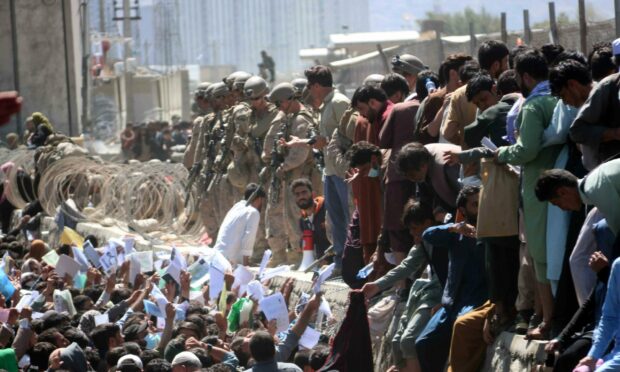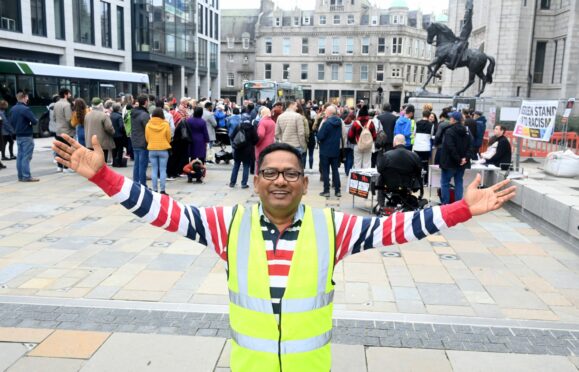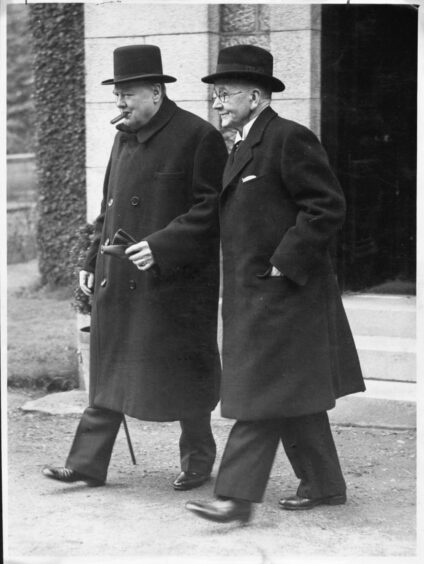Recently 185 refugees from Afghanistan were welcomed to Aberdeen with the usual fanfare of Scottish hospitality, music and cultural offerings.
Speakers met at a rally outside Marischal College, under the gaze of Robert the Bruce holding aloft the Freedom Lands Charter – an apt symbol of freedom. Speakers including Afghans living in Scotland and Robert Gordon College’s new Principal Robin Macpherson attended, alongside drummers, fiddlers and planned or passing crowds, keen on being part of the welcome.
That evening I was honoured to be dining with some fine Afghan cuisine, Kabuli pulao – the food offered for new people and named after the now well-known town of Kabul.
In discussion with my hosts, it became clear that cultural connections between Afghan and Scottish people and how we all might be able to help the incoming refugees were not the main agenda items. The principal topic of concern was keeping the light shining on the oppressors in Afghanistan – the Taliban.
Bribery, corruption and barbarity in Afghanistan
I was struck by how those who had escaped were determined to survive and thrive. People are remarkably resilient and adaptable. Some left with only the clothes on their back in the chaotic Kabul airport scenes. Those escaping were the lucky ones.
However, there are many left in a country and system which is corrupt, inhumane and oppressive. The plight of these people is of real concern, but the media attention given to US president Joe Biden’s withdrawal and the immediate power vacuum it created has gone. No one seems interested now in the issue.
The initial outputting of grief and supportive words soon dwindled, as day-to-day life went on and news reporting moved on to the next big story. However, bribery, corruption and barbarity are back in Afghanistan, by all accounts.
So, what can be done?
Aberdeen’s rich history of helping those in peril
Aberdeen has a rich history of supporting those in peril. During the second world war, Aberdeen Lord Provost, Sir Thomas Mitchell, was a close associate of prime minister Winston Churchill. Our current Lord Provost, and keen historian, Barney Crockett recently shared the story of Churchill’s 1946 visit to receive the Freedom of the City.
As well as speaking at the University of Aberdeen and the Music Hall, he also made a visit – before the pomp and circumstance – to the Jaffrey family. Their staunch support of the Kindertransport saved the lives of many Jewish children, at a time when Nazi oppressors rampaged over Europe. Kindertransport helped as many as 10,000 children escape.
During his Aberdeen visit, Churchill was met by Ernestine Friedlander, a refugee who had been taken in by Sir Thomas and Lady Jaffrey. Jaffrey – along with many others who supported the Kindertransport – is a forgotten hero, deserving of being added to Provost Skene’s House’s new hall of fame.
Nazi-ism not only ripped through Europe between 1939 and 1945, but left many scars long after. Multiple nations saw decades of conflict in the post-war period, and the impact was on both the oppressed and, indeed, the oppressors.
Long shadow of guilt, sadness and suffering
I remember working with the German embassy many years ago to look at how Scotland’s school history curriculum could, and should, cover not just Germany and the wars, but the rich tapestry of German history. Two world wars left a long shadow for Germans: one of guilt, sadness and suffering.
This month, a fascinating event took place in Germany. Zapfenstreich is a military ceremony performed in Germany and Austria, not dissimilar to our military tattoos. Military bands play music and armed forces parade.
The high point of today’s events in Berlin marking the end of the Afghanistan mission — a torchlight tattoo outside the Bundestag. pic.twitter.com/iKXTPOYHLt
— Richard Walker (@rbsw) October 13, 2021
The event this year, in front of the Reichstag, had a haunting resemblance to 1930s Germany, with soldiers marching with torchlights in tight formation. However, do not be taken in by this immediate and understandable comparison which many made on social media.
Zapfenstreich takes place as a special event – national celebrations, solemn civic commemorations, honouring distinguished individuals, farewell ceremonies, or at the conclusion of military exercises. This Zapfenstreich was to mark all the German troops who served in Afghanistan. This in itself is quite a remarkable symbol of progress.
Goodwill and restoration needed for a better society
Germany was banned from armed forces engaging overseas following World War Two. Today, much has changed, with German troops stood side-by-side international partners in Kosovo (in 1999), Iraq and Afghanistan. There is still some angst about Germany’s role overseas but progress has been made, forgiveness found and restoration enabled.
Peace comes about through various means. Brute force is needed to combat oppressors, but also acts of goodwill and restoration are needed.
Aberdeen’s warm welcome to Afghan people was, in itself, a celebration of humanity.
And, so, what is needed for Afghanistan now, months after the well-publicised withdrawal of US troops and the British embassy? Continued awareness of the wrongs of the oppressive regimes, goodwill to those who have suffered at their hands, and the promotion of restorative practice which engenders a better society.
Aberdeen’s warm welcome to Afghan people was, in itself, a celebration of humanity. It builds on a long history of the area demonstrating humanitarian support.
Long may we all strive to support people in peril and stand up against wrongdoing and oppression.
Neil McLennan writes in a personal capacity. He is a Burgess of Aberdeen and has supported every aspect of education in the north-east. His fee for this column will be donated to the Red Cross


